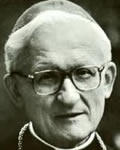
Born in Horhausen, Höffner attended the seminary in Freiburg im Breisgau and the Pontifical Gregorian University in Rome before being ordained to the priesthood by Cardinal Francesco Marchetti-Selvaggiani on October 30, 1932. He finished his studies in 1934, and then did pastoral work in Trier until 1945. After teaching at the Trier seminary for six years, Höffner was named to the University of Münster in 1951. He was the founder, director, and a professor of the Institute of Christian Social Sciences in Munich from 1951 to 1961, and was also a scientific advisor to three ministries of the Federal Republic._x000D_
On July 9, 1962, Höffner was appointed Bishop of Münster. He received his episcopal consecration on the following September 14 from Bishop Matthias Wehr, with Bishops Heinrich Baaken and Heinrich Tenhumberg serving as co-consecrators. Höffner attended the Second Vatican Council from 1962 to 1965, and was promoted to Coadjutor Archbishop of Cologne and Titular Archbishop of Aquileia on January 6, 1969. He succeeded Josef Frings as Archbishop of Cologne on February 24 of that same year._x000D_
Höffner was created Cardinal-Priest of S. Andrea della Valle by Pope Paul VI in the consistory of April 28, 1969. From 1976 to 1987, he was Chairman of the Conference of the German Bishops and thus the highest representative of the Catholic Church in Germany. The German prelate was one of the cardinal electors who participated in the conclaves of August and October 1978, which selected Pope John Paul I and Pope John Paul II respectively. Höffner resigned as Cologne's archbishop on September 14, 1987, after a period of seventeen years._x000D_
Höffner died the next month in Cologne at age 80, and is buried in the Cologne Cathedral. An expert in Catholic social doctrine, he was awarded the posthumous honor of "Righteous Among the Nations" in 2003 by the State of Israel, for having saved Jewish lives during World War II.[1] The Deutsche Post honored him in 2006, on the occasion of his 100th birthday, with a stamp, which included his photo and episcopal motto "Justitia et Caritas".




